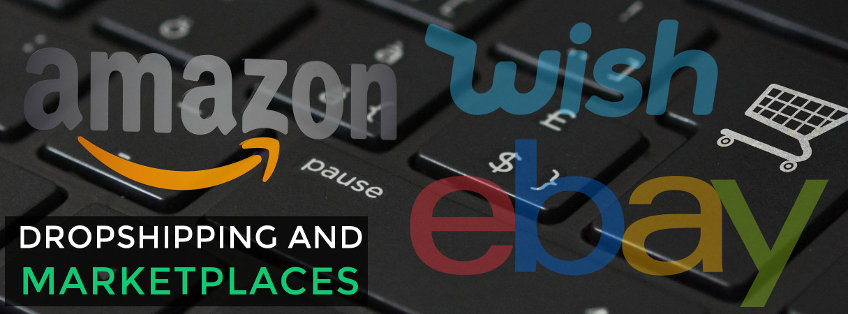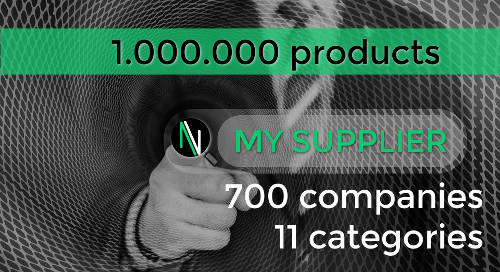Finally you have decided to open your own shop in DropShipping and after having evaluated for good pros and cons, to give a good boost to your business you have decided to rely on the marketplace. And now you're wondering if it's a wise choice.
What are the marketplaces?
First of all I'd like to do a bit of clarity trying to give a synthetic definition of what the marketplaces are and why they can be a good way to develop your business.
A marketplace is an internet brokerage website for the purchase or sale of a good or a service.
The main feature of the marketplaces is to sell the goods of different manufacturers, sellers, companies under the same site-brand.
The concept is that of the supermarket: different shelves, different brands, a single manager to whom the customer relies because he knows he is able to find a great variety of choice and reliability in him.
In theory, therefore, any product company and distribution / trade can benefit from its entry into the marketplace, taking care to choose the one that best suits its business.
Is it convenient to sell in DropShipping on the marketplaces?
There are so many marketplaces for all tastes.
People buy in the marketplaces mainly for their reliability and for the clarity and simplicity with which they expose their products. They also tend to be increasingly specialized and more complete; many products are often unavailable in stores or small online sites and you can find them only in the most important marketplaces.
Does it make sense to sell on your website, or just how small markets are slowly disappearing to the detriment of large international supermarkets full of products, so will the small websites also disappear?
The answer is "yes and no"!
Certainly it will be easier and more immediate for you to sell in a big marketplace than a normal website, but this will mean you first of all a big reduction in margins and then some risk.
It will therefore be essential to carefully evaluate their margins as almost all marketplaces, in fact, offer the possibility to sell asking you to pay a variable monthly fee (from € 20.00 upwards) and a final commission on sale (also variable based on to the marketplace itself and to the product category in which their products are inserted); in addition you will have to stick to their strict behavioral rules.
Therefore, if on the one hand it is easier to sell, on the other hand, in addition to the reduction in margins, there is the real risk of a collapse of one's own business, as the expansion of its customers is almost non-existent.
People buy and buy because they trust mainly the marketplace and not your store.
In addition, many marketplaces prevent the collection of contact data from end customers, also affecting your next direct approach to the customer.
In the worst cases, then, from one day to the next, you can find your store closed and a ban for life, for violating (perhaps even unknowingly) some rules on copyright of the images, on the sale of brands that do not authorize online sales or anything else.
Just do some research on the net to find hundreds of sellers in the throes of rage, for being literally thrown out of their trust marketplace, perhaps after investing important capital for the start-up and management of their business on the marketplace itself and have spent so much of their time.
I do not want to scare you but in dropshipping most of the time you do not have a real control on the brands you intend to sell.
Maybe the supplier with whom you have reached an agreement provides you with a list of products to sell well nourished by dozens of producers but that you do not really know in the least, and if you do not have an authorization to sell certain brands, you will find your store banned within a few weeks of opening, with the impossibility of being able to reopen in that same marketplace.
In addition, many marketplaces also manage your "piggy bank", or keep for a few days / weeks your revenues from sales and if your shop should be banned for irregularities, these collections would be blocked immediately and then be unlocked over time (up several months) after completely resolving any dispute.
In short, the marketplaces are cross and delight for the dropshipper.
Some marketplaces briefly prohibit sales in dropshipping, others allow it, but hide many pitfalls.
However one thing is certain, you must be well aware of what you sell and if you do it with criteria then you could have great satisfaction:
the reach of the marketplaces is huge and your sales in a short time could encrase exponentially!
What are the best marketplaces to sell in dropshipping?
39 online marketplaces in Germany, 24 in France and 13 in Italy, plus dozens in other EU countries and non-EU countries: e-commerce in the world is not just Amazon and eBay, even if these are the well-known names that make the titles. In all, there are more than 220 Internet-buying platforms, proving that e-commerce has already won over many consumers.
So .. you have chosen your business, you have evaluated pros and cons and you are ready to explore new horizons, very well then let's see together which are the main world marketplaces and especially in which categories are specialized.
You do not want to sell shoes in a marketplace that specializes in electronics, do you?
And here are all the alternatives to Amazon and eBay in the world to sell in DropShipping.
The order shown is for geographical areas of origin of the various marketplaces.
Jumia
Jumia is an
African marketplace operating in 14 countries representing 1.2 billion potential customers. It has roughly 50,000 sellers. It is the
largest marketplace in Africa, covering approximately 80 percent of the African internet population.
www.jumia.com.ng/
Kilimall
Kilimall is a
marketplace that operates in
Kenya, Nigeria, and Uganda. It has thousands of sellers targeting over 200 million consumers. The marketplace sells products only in English, making it easier for sellers to create product copy once and sell in all three countries.
www.kilimall.co.ke/
Alibaba
Alibaba is the
giant Chinese B2B marketplace. It has customers in 200 countries buying over 100 million products across 40 different categories.
www.alibaba.com/
AliExpress
AliExpress is an
Alibaba-owned marketplace that targets buyers outside
China. It has a
global English site and supports 15 other languages: Russian, Portuguese, Spanish, French, German, Italian, Dutch, Turkish, Japanese, Korean, Thai, Vietnamese, Arabic, Hebrew, and Polish.
www.aliexpress.com/
Flipkart
Flipkart is
India’s largest marketplace with over 10 million customers buying from roughly 100,000 suppliers. Flipkart’s logistics network helps sellers deliver their products faster. It also provides funding to sellers. Walmart recently purchased a controlling interest in Flipkart.
www.flipkart.com/
GittiGidiyor
GittiGidiyor is a
Turkish marketplace owned by eBay with 60 million monthly visits and nearly 19 million registered users. It sells over 15 million products across 50 different categories. A large percentage of orders come from mobile users.
www.gittigidiyor.com/
HipVan
HipVan is a
Singapore-based marketplace that sells home furnishings. Roughly 90,000 consumers have purchased from the site.
www.hipvan.com/
JD.com
JD.com is a
Chinese marketplace with over 300 million users. It also has a presence in
Spain, Russia, and Indonesia. It is one of the largest marketplaces in the world with thousands of suppliers and its own logistics infrastructure.
www.jd.com/
Kaola
Kaola is a
Chinese marketplace that is part of the
NetEase group, a
China-based technology company. Kaola is a popular cross-border shopping platform in China. Sellers can set up a store on Kaola, or they can sell wholesale to Kaola, which then resells to consumers.
www.kaola.com/
Lazada
Lazada, a
marketplace owned by Alibaba Group, operates in
Indonesia, Malaysia, Philippines, Singapore, Thailand, and Vietnam. Lazada has thousands of merchants, generating roughly $1.5 billion in annual sales.
www.lazada.com.ph/
Qoo10
Qoo10 is a
Singapore-based marketplace. It also operates in
China, Indonesia, Malaysia, and Hong Kong. Anyone registered to buy on Qoo10 can also become a seller. Qoo10 is paid only after a sales transaction is completed.
www.qoo10.sg/
Rakuten
Rakuten is a
giant Japanese marketplace that sells over 18 million products. It has served over 20 million customers. It also has a presence in the
USA.
global.rakuten.com/en/
Shopee
Shopee is a
Southeast Asian marketplace operating in
Singapore, Malaysia, Thailand, Taiwan, Indonesia, Vietnam, and the Philippines. It offers more than 180 million products. Merchants can easily register online or via the mobile app.
shopee.ph/
Snapdeal
Snapdeal is an
Indian marketplace with over 300,000 sellers and 35 million products. Sellers must be registered businesses in
India.
www.snapdeal.com/
Souq
Souq is a
marketplace based in the
Middle East and
owned by Amazon. Millions of customers shop on the site each month.
uae.souq.com/ae-en/
Taobao
Taobao is a
Chinese marketplace owned by Alibaba. It has 600 million active users — the largest in the world — and over a billion products for sale. Selling on Taobao is easier for retailers that have a presence in China.
world.taobao.com/
Tmall
Tmall is a
Chinese marketplace, also
owned by Alibaba, that sells branded goods to customers in China and the surrounding countries. It, too, is one of the largest ecommerce
marketplaces in the world with roughly 500 million users and many thousands of sellers.
www.tmall.com/
VIP.com
VIP.com is a
Chinese marketplace that focuses on flash sales. It has roughly 60 million active users and more than 20,000 brands. Retailers from outside
China can sell on this
marketplace.
www.vip.com
The Iconic
The Iconic is a
marketplace operating in
Australia and
New Zealand. It launches 200 products daily and targets mostly younger females.
www.theiconic.com.au/
MyDeal
MyDeal is an
Australian marketplace with 200,000 products across over 2,000 categories. Sellers must pass a product quality check before they can participate.
www.mydeal.com.au/
Allegro
Allegro is
the largest Polish marketplace, with more than 15 million customers and 70 million monthly product sales. All business is conducted in Polish.
allegro.pl/
Asos
Asos is a
U.K-based marketplace that targets younger shoppers. It sells over 80,000 products and also has marketplaces in
Australia, U.S., France, Germany, Spain, Russia, and Italy.
www.asos.com/
Bol.com
Bol.com is a
Belgian marketplace and has recently been voted
the most popular retailer among Dutch consumers for its range, fast delivery and convenience.
It has nearly 16 million articles in more than 20 categories, including
electronics, toys, books, children's items, health and lifestyle products, jewelry and accessories, sports and leisure.
www.bol.com
Catawiki
Catawiki is a unique
Italian marketplace. Offers the possibility to sell by organizing weekly auctions for objects of various categories, including
art, antiques, vintage cars, watches, jewelry, fashion, books and stamps. With over 14 million visitors per month and 100,000 global sellers, the Catawiki team can count on nearly 200 experts, whose job is to fill out the auctions in detail, providing an estimate of value, and making sure that Catawiki there is always a large selection of proven batches.
www.catawiki.it/
Cdiscount
Cdiscount is a
French marketplace with roughly 1 million unique daily visitors. It sells products across a broad range of categories with over €2 billion in annual sales.
www.cdiscount.com/
Cel
Cel is a
Romanian marketplace that sells over 50,000 products to roughly half a million customers. Retailers can sign up for free.
www.cel.ro/
Emag
Emag is
the largest ecommerce site in Romania with thousands of daily customers. Retailers can sign up for free.
www.emag.ro/
ePRICE
Eprice is the
100% Italian marketplace. It sells new products in many categories, has an extensive network of delivery points to manage Pick & Pay. It has a catalog of 5 million articles in numerous categories ready to be delivered to millions of Italian users.
www.eprice.it/
Farfetch
Farfetch is a Por
tuguese marketplace with a
luxury imprint. Currently it counts about 300 high-end stores, the peculiarity is linked to the fact that it offers space only to online stores that have however also a physical and established reality. It offers great potential for those who sell
luxury clothing and jewelery and have a global reach.
www.farfetch.com
Flubit
Flubit is a
U.K.-based marketplace. It’s known for competitive pricing. It has over 60 million products and allows sellers to integrate their product catalogs.
flubit.com/
Fnac
Fnac is a
French marketplace that sells a wide assortment of products to millions of customers. It also has physical stores in France and other countries and has integrated the omnichannel experience.
www.fnac.com/
Fruugo
Fruugo is a
U.K.-based marketplace in
32 countries. Sellers can register once to sell across these countries. The site supports
21 currencies and
17 languages.
www.fruugo.com/
Game
Game is
U.K. based and focuses on selling
games, toys, and media products. The site has grown dramatically in the last few years. It processes thousands of orders every month.
www.game.co.uk/
Ibs.it
IBS.it (Internet Bookshop) is an
Italian online bookshop which has become a real marketplace a few years ago. Active since 1998, it was the first electronic commerce company in Italy, having registered the very first online purchase certified by credit card. IBS.it can count on over 3 million registered users, interested in buying
CDs, DVDs, vinyls, video games, toys, ebooks and so on.
www.ibs.it/
La Redoute
La Redoute is one of the most popular
online stores in France. Specialized in
mid-range and premium fashion and homeware, equally divided between own brands and external brands such as Adidas, Superdry, Mango and Petit Bateau. The company is present in
France and in 26 other countries it has over 11 million registered users, 90% of which are female. Its demographic core is women between 25 and 45 years.
www.laredoute.com/
Manomano
Manomano is a young but growing
French marketplace. It is the ideal reference in the world of faidate and bricolage. With a catalog of over 250 thousand products and more than 13 million sales has a good reach and is used throughout Europe.
www.manomano.com
Mobile.de
Mobile.de is a
German marketplace for selling
vehicles to businesses and consumers. The site has customers from throughout Europe.
www.mobile.de/
Okazii
Okazii is an 18-year-old
Romanian marketplace. It sells over 3,000 products daily and receives roughly 3 million monthly visitors.
www.okazii.ro/
OnBuy
OnBuy is a
U.K.-based marketplace that attracts shoppers by offering affordable prices. It charges low fees to sellers.
www.onbuy.com/gb/
Otto
Otto is a popular
German marketplace. It launched in 1995. Nearly half of the residents in Germany have shopped on the site. Merchants can target the German market, but the product information needs to be localized.
www.otto.de/
Pixmania
Pixmania is a
marketplace of French origin and specializes in
electronics and technology. Its catchment area is very high and they work all over Europe. It is not famous for being an economic marketplace, on the contrary it is among the most expensive, but offers concretely many opportunities.
www.pixmania.com
PriceMinister
PriceMinister is a
French marketplace owned by
Rakuten. It is reportedly the fifth most visited ecommerce site in France. Its seller program enables easy setup with no long-term contracts.
www.priceminister.com/
Privalia
Privalia is a
Spanish marketplace specialized in
fashion and lifestyle outlets. Today Privalia, with its 8 million active users and 500 brands, is the international benchmark in the sector and a leader in Europe for the online outlet and temporary e-commerce market.
www.privalia.com/
Real.de
Real.de is a
German marketplace that sells millions of products in categories such as
electronics, toys, home and garden items, fashion, and furniture. Merchants can sell on Real.de or, alternatively, send shoppers to the merchants’ own sites.
www.real.de/
Spartoo
Spartoo is a
French marketplace and is very familiar in its country of origin and in most of
Europe. Specializing in shoes and clothing, he operates in 30 European countries including
Italy, Belgium, Denmark, Finland, France and the United Kingdom. Serves clients in 12 different languages. With 450 million users, the main demographic core of Spartoo are women between 30 and 40 years.
www.spartoo.com/
Yoox
Yoox is an
Italian marketplace with over
30 mono-brand stores for designer labels and high fashion accessories all over the world. The windows of Yoox are different from those of other online shopping sites, such as Dawanda and Ebay, for the selection of clothing, accessories and footwear belonging to the most prestigious brands in the world. For many it is defined the online outlet par excellence, as the sale is reserved only for companies selected not to the mass.
www.yoox.com
Zalando
Zalando is a
German marketplace that has expanded to multiple countries in Europe. It initially attempted to replicate
Zappos (the U.S.
footwear site) but has since evolved into one of the largest ecommerce portals in Europe. It has over 22 million customers and sells over 250,000 products representing 2,000 merchant brands.
www.zalando.com/
Amazon
Amazon is
the largest ecommerce company in the world. It operates marketplaces in
14 countries: U.S., Australia, Brazil, Canada, China, France, Germany, India, Italy, Japan, Mexico, Netherlands, Spain, and the U.K. Amazon also runs separate marketplaces for businesses, called Amazon Business.
www.amazon.com/
Bonanza
Bonanza is a
seller-friendly marketplace with more than 10 million items. It has no listing fees and no monthly store fees. It sells in
Canada, U.K., France, India, Germany, Mexico and Spain.
www.bonanza.com/
Cratejoy
Cratejoy is a
marketplace for selling
subscription boxes. The boxes cater to consumer interests, such as healthcare and regional affinity. The site receives roughly 30,000 monthly transactions and more than 3 million monthly page views.
www.cratejoy.com/
eBay
eBay has sites for
24 countries:
U.S., Canada, Austria, Belgium, France, Germany, Ireland, Italy, Netherlands, Poland, Spain, Switzerland, U.K., Australia, China, Hong Kong, Indonesia, Japan, Malaysia, Philippines, Singapore, Taiwan, Thailand, and Vietnam.
www.ebay.com/
Etsy
Etsy is a
global marketplace for creative, handmade products. Etsy focuses on helping the community of sellers become successful by making it easy and cheap to list products and start selling. The site serves roughly 30 million customers annually.
www.etsy.com/
Jet
Jet is
owned by Walmart, but it operates as an independent site. It offers sellers a rules engine to optimize their profitability. The site receives millions of daily visitors.
jet.com/
Groupon
Groupon non è un
marketplace di tipo classico, ma lo potremmo definire
l’”Amazon” dei servizi. Permette grandissime opportunità per le proprie vendite anche se i suoi costi eccessivi minano la marginalità del proprio business.
www.groupon.com
Newegg
Newegg is a
global electronics marketplace that has been in business for 17 years. It has tens of millions of customers and sells products in 50 countries.
www.newegg.com/
Overstock
Overstock is a
marketplace born from the sale of
stocks of goods purchased from failed and unsuccessful companies and sold at prices lower than wholesale prices. In a short time, its turnover has become a billionaire and is now the ideal place for all business brokers.
www.overstock.com/
Reverb
Reverb is a
marketplace for musicians to buy, sell, and learn about new, used, vintage and handmade music gear. It connects millions of people to musical products and inspiration. Roughly 80 million worldwide users visit the site annually.
reverb.com/
Sears
Sears is now also a
marketplace. First
the largest US distribution chain for mail order sales in the catalog, now offers the opportunity for many sellers to be able to offer their products. Its catalog has more than one million products available.
www.sears.com/
Walmart
Walmart started accepting online third-party sellers in 2016. Since then thousands have signed up. The site sells more than 1 million products; sellers can list items for free.
www.walmart.com/
Wayfair
Wayfair is a
marketplace focused on
home décor and home furnishings. It lists more than 10 million products from over 10,000 suppliers.
www.wayfair.com/
Wish
Wish is a B2C marketplace with roughly 100 million annual visitors. Most of the items are low priced. Wish is reportedly the most downloaded shopping app globally.
www.wish.com/
Zibbet
Zibbet is a
marketplace of independent artists, crafters, and vintage collectors. It is similar to Etsy. Roughly 50,000 sellers offer mostly handmade products on the site.
www.zibbet.com/
Americanas
Americanas is a
Brazilian online marketplace with roughly 500,000 products and 10 million customers. The site has over 20,000 marketplace sellers — B2C and B2B. Its parent company also own Submarino (below).
www.americanas.com.br/
Casas Bahia
Casas Bahia is a
Brazilian marketplace with over 20 million monthly visitors. It mostly sells furniture and home appliances. The company also has a large physical presence and runs 750 brick-and-mortar stores across Brazil.
/www.casasbahia.com.br/
Dafiti
Dafiti is a
Latin American marketplace with millions of unique monthly visitors. It is newer than other marketplaces, but it has grown quickly. It offers tools to sellers for onboarding and general success.
www.dafiti.com.br/
Extra
Extra is a
Brazilian marketplace that receives almost 30 million visitors per month. It works closely with other marketplaces. The site is owned by Cnova, which operates physical stores, providing Extra’s customers with an omnichannel experience.
www.extra.com.br/
Linio
Linio is an
online marketplace with a presence in eight
Latin American countries: Mexico, Panama, Venezuela, Colombia, Ecuador, Peru, Chile, and Argentina — representing roughly 300 million potential customers. Linio has over 3 million products and 10,000 sellers. It has roughly 50 million monthly visitors.
www.linio.com.co/
Mercado
Mercado Libre is
the largest marketplace in Latin America. It receives approximately 150 million monthly users and operates in
Argentina, Bolivia, Brazil, Chile, Colombia, Costa Rica, Dominican Republic, Mexico, Ecuador, Guatemala, Honduras, Peru, Panama, Portugal, Uruguay, and Venezuela.
www.mercadolibre.com/
As you could see the list is very large and each of these marketplaces could be your launch pad by virtue of the specialization in sales in certain categories.
Now you're wondering: if there were more marketplaces that could interest me, would it be appropriate to sell in multiple marketplaces at the same time?
Is it convenient to sell dropshipping on multiple marketplaces at the same time?
After I have mentioned for you all the risks you are facing selling on the marketplace if you are still convinced, then it means that you have found a really good business, exclusive and with good margins, to start.
So why not start it big !?
Certainly every marketplace will have monthly costs to deal with but the commissions of each of them will be charged only after making sales, if you sell / spend, so it would be appropriate to try.
But it is important to organize yourself well as you will have to coordinate your inventory well, updating it constantly on all the marketplaces on which you will decide to sell.
You will never have to risk selling products that you no longer have in stock, customers will not like to see their orders canceled and you would risk receiving negative feedback.
Fundamental will be to have a good system of integration between the marketplace and your ERP (Enterprise Resource Planning), which will allow you to manage orders and stocks all automatically avoiding to waste hours and hours to control all platforms manually.













